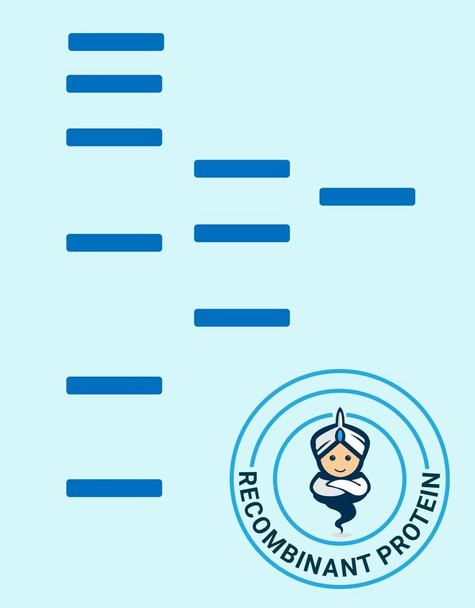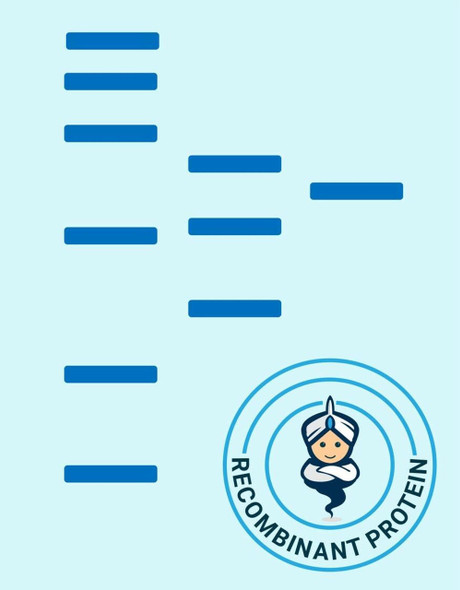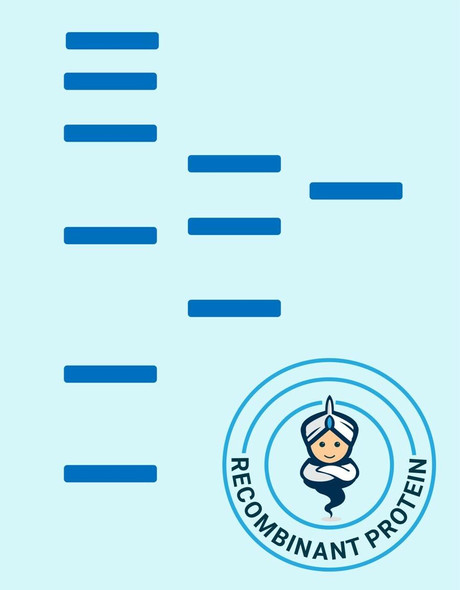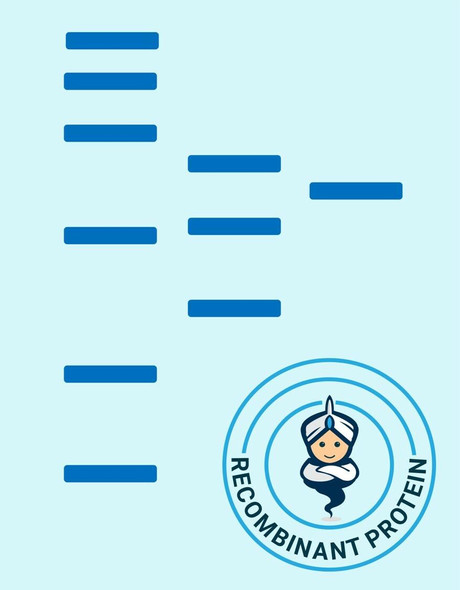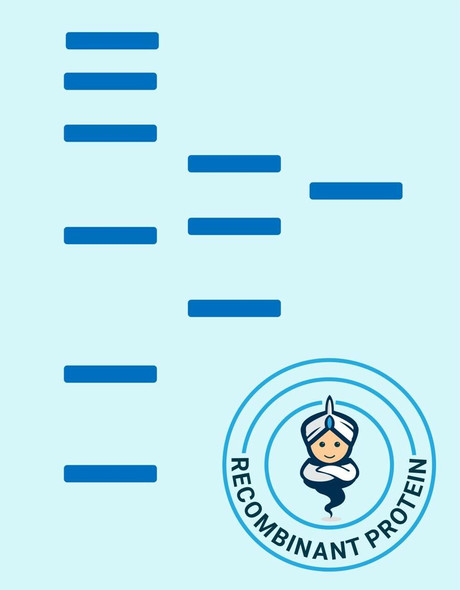Human PIM1 Recombinant Protein (RPPB4249)
- SKU:
- RPPB4249
- Product Type:
- Recombinant Protein
- Species:
- Human
- Uniprot:
- P11309
Description
| Product Name: | Human PIM1 Recombinant Protein |
| Product Code: | RPPB4249 |
| Size: | 10µg |
| Species: | Human |
| Target: | PIM1 |
| Synonyms: | PIM, Serine/threonine-protein kinase pim-1, PIM1. |
| Source: | Escherichia Coli |
| Physical Appearance: | Sterile Filtered colorless solution. |
| Formulation: | PIM1 protein solution (0.5mg/ml) contains 20mM Tris-HCl buffer (pH 8.0), 0.15M NaCl, 10% glycerol and 1mM DTT. |
| Stability: | Store at 4°C if entire vial will be used within 2-4 weeks. Store, frozen at -20°C for longer periods of time. For long term storage it is recommended to add a carrier protein (0.1% HSA or BSA).Avoid multiple freeze-thaw cycles. |
| Purity: | Greater than 90% as determined by SDS-PAGE. |
| Amino Acid Sequence: | MGSSHHHHHH SSGLVPRGSH MYQVGPLLGS GGFGSVYSGI RVSDNLPVAI KHVEKDRISD WGELPNGTRV PMEVVLLKKV SSGFSGVIRL LDWFERPDSF VLILERPEPV QDLFDFITER GALQEELARS FFWQVLEAVR HCHNCGVLHR DIKDENILID LNRGELKLID FGSGALLKDT VYTDFDGTRV YSPPEWIRYH RYHGRSAAVW SLGILLYDMV CGDIPFEHDE EIIRGQVFFR QRVSSECQHL IRWCLALRPS DRPTFEEIQN HPWM |
PIM1, which is a part of the Ser/Thr protein kinase family and PIM subfamily, is expressed primarily in B-lymphoid and myeloid cell lines, and is overexpressed in hematopoietic malignancies and in prostate cancer. PIM1 functions as Proto-oncogene with serine/threonine kinase activity involved in cell survival and cell proliferation, consequently providing a selective advantage in tumorigenesis. Both human and orthologous mouse genes have been reported to encode two isoforms resulting from the use of alternative in-frame translation initiation codons, the upstream non-AUG (CUG) and downstream AUG codons.
PIM1 Human Recombinant produced in E.Coli is a single, non-glycosylated polypeptide chain containing 274 amino acids (38-290 a.a.) and having a molecular mass of 31.4kDa. PIM1 is fused to a 21 amino acid His-tag at N-terminus & purified by proprietary chromatographic techniques.
| UniProt Protein Function: | Pim1: a proto-oncogene serine/threonine kinase involved in cell survival and cell proliferation and thus providing a selective advantage in tumorigenesis. Exerts its oncogenic activity through: the regulation of MYC transcriptional activity, the regulation of cell cycle progression and by phosphorylation and inhibition of proapoptotic proteins (BAD, MAP3K5, FOXO3). Phosphorylation of MYC leads to an increase of MYC protein stability and thereby an increase of transcriptional activity. The stabilization of MYC exerced by PIM1 might explain partly the strong synergism between these two oncogenes in tumorigenesis. Mediates survival signaling through phosphorylation of BAD, which induces release of the anti-apoptotic protein Bcl- X(L)/BCL2L1. Phosphorylation of ASK1 an other proapoptotic protein, by PIM1, significantly decreases ASK1 kinase activity and inhibits MAP3K5-mediated phosphorylation of JNK and JNK/p38MAPK subsequently reducing caspase-3 activation and cell apoptosis. Stimulates cell cycle progression at the G1-S and G2-M transitions by phosphorylation of CDC25A and CDC25C. Phosphorylation of p21Cip1, a regulator of cell cycle progression at G1, results in the relocation of p21Cip1 to the cytoplasm and enhanced p21Cip1 protein stability. Promote cell cycle progression and tumorigenesis by down-regulating expression of a regulator of cell cycle progression, p27Kip1, at both transcriptional and post- translational levels. Phosphorylation of p27Kip1,induces 14-3-3- proteins binding, nuclear export and proteasome-dependent degradation. May affect the structure or silencing of chromatin by phosphorylating HP1 gamma/CBX3. Acts also as a regulator of homing and migration of bone marrow cells involving functional interaction with the CXCL12-CXCR4 signaling axis. Isoform 2 is isolated as a monomer whereas isoform 1 complexes with other proteins. Binds to RP9. Isoform 1, but not isoform 2, binds BMX. Isoform 2 interacts with p27Kip1 and FOXO3. Interacts with BAD. Interacts with PPP2CA; this interaction promotes dephosphorylation of PIM1, ubiquitination and proteasomal degradation. Interacts with HSP90, this interaction stabilizes PIM1 protein levels. Ubiquitinated form interacts with HSP70 and promotes its proteosomal degradation. Strongly induced in leukocytes by the JAK/STAT pathway in response to cytokines. Induced by different cellular stresses, heat shock and cytotoxic agents. Expressed primarily in cells of the hematopoietic and germline lineages. 2 isoforms of the human protein are produced by alternative initiation. Both isoforms are expressed in prostate cancer cell lines. |
| UniProt Protein Details: | Protein type:Protein kinase, CAMK; Protein kinase, Ser/Thr (non-receptor); Oncoprotein; Kinase, protein; EC 2.7.11.1; CAMK group; PIM family Chromosomal Location of Human Ortholog: 6p21.2 Cellular Component: cytoplasm Molecular Function:ATP binding; manganese ion binding; protein binding; protein serine/threonine kinase activity; ribosomal small subunit binding; transcription factor binding Biological Process: cell proliferation; multicellular organismal development; negative regulation of apoptosis; negative regulation of transcription factor activity; protein amino acid autophosphorylation; protein amino acid phosphorylation |
| NCBI Summary: | The protein encoded by this gene belongs to the Ser/Thr protein kinase family, and PIM subfamily. This gene is expressed primarily in B-lymphoid and myeloid cell lines, and is overexpressed in hematopoietic malignancies and in prostate cancer. It plays a role in signal transduction in blood cells, contributing to both cell proliferation and survival, and thus provides a selective advantage in tumorigenesis. Both the human and orthologous mouse genes have been reported to encode two isoforms (with preferential cellular localization) resulting from the use of alternative in-frame translation initiation codons, the upstream non-AUG (CUG) and downstream AUG codons (PMIDs:16186805, 1825810).[provided by RefSeq, Aug 2011] |
| UniProt Code: | P11309 |
| NCBI GenInfo Identifier: | 83305339 |
| NCBI Gene ID: | 5292 |
| NCBI Accession: | P11309.3 |
| UniProt Secondary Accession: | P11309,Q38RT9, Q5T7H7, Q96RG3, |
| UniProt Related Accession: | P11309 |
| Molecular Weight: | 35,686 Da |
| NCBI Full Name: | Serine/threonine-protein kinase pim-1 |
| NCBI Synonym Full Names: | Pim-1 proto-oncogene, serine/threonine kinase |
| NCBI Official Symbol: | PIM1�� |
| NCBI Official Synonym Symbols: | PIM�� |
| NCBI Protein Information: | serine/threonine-protein kinase pim-1 |
| UniProt Protein Name: | Serine/threonine-protein kinase pim-1 |
| Protein Family: | Protein |
| UniProt Gene Name: | PIM1�� |
| UniProt Entry Name: | PIM1_HUMAN |

